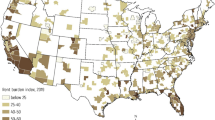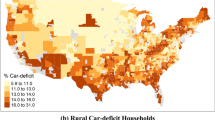Abstract
Does car ownership matter for urban well-being and planning? By using data from the China Household Finance Survey, we test how a variety of factors, particularly car ownership, impact happiness, the cognitive dimension of well-being. We find that vehicle possession does enhance happiness in urban China as a status good, at least in the short term. Driving a luxury car brings the owner more satisfaction and joy than driving a frugal car. The long-term detrimental impact of the booming vehicle fleet on urban areas is discussed and the contention about the car ownership controls is also debated. By doing so, we hope to provide insights on the hedonic aspect of car consumption and help transport practitioners develop viable strategies to promote sustainable transportation.


Similar content being viewed by others
Data Availability
The datasets analyzed during the current study are available at https://chfs.swufe.edu.cn/sjzx.htm
The author is responsible for correctness of the statements provided in the manuscript.
Notes
Oh, J. E., Transport for Development (2021).
The World Bank Statistics (2015).
Oh, J. E., Transport for Development (2021).
Bureau of Transportation Statistics, U.S. 2021.
Sumit et al. (2020).
National Bureau of Statistics of China (2020).
IPSOS is a global market research and public opinion specialist.
The latest CHFS data is Wave 2019. This database, however, is not accessible for scholars outside mainland China.
S. Sha, T. Huang and E. Gabardi (2013).
Statistics from the China Passenger Car Association (2021).
For example, China’s transport spending hit $72.66 billion in the first quarter of 2019 alone.
Number of Online Ride-Hailing Users in China, 2016–2021, Statista.
Ride-Hailing vs. Ride-Sharing: The Key Difference and Why It Matters. Ecolane; October 18, 2018.
Daniel Ren Business | China Business (2022)
China’s transition to electric vehicles, Nancy W. Stauffer (April 29, 2021).
China: Urbanization 2021 | Statista.
References
Beja, E. L. (2015). Direct and indirect impacts of parenthood on happiness. International Review of Economics, 62, 307–318.
Blanchflower, D. G., & Oswald, A. J. (2004). Well-being over time in Britain and the USA. Journal of Public Economics, 88, 1–17.
Charles, K., Hurst, E., & Roussanov, N. (2009). Conspicuous consumption and race. Quarterly Journal of Economics, 124(2), 425–467.
Chyi, H., & Mao, S. (2012). The determinants of happiness of China’s elderly population. Journal of Happiness Studies, 13, 167–185.
Cui, Z. (2018). Happiness and consumption: Evidence from China. International Review of Economics, 65, 403–419.
Diener, E., & Biswas-Diener, R. (2002). Will money increase subjective well-being? A literature review and guide to needed research. Social Indicators Research, 57, 119–169.
Easterlin, R. (1974). Does economic growth improve the human lot? Some empirical evidence. In P.A. David & M.W. Reder (Eds.), Nations and households in economic growth (pp. 89–125). Academic Press.
Feng, Suwei. (2020). A research review on car ownership control policy in Shanghai, China. Prime archives in transportation and logistics. Vide Leaf.
Hine, et al. (2019). Evidence of the impact of rural road investment on poverty reduction and economic development. K4D helpdesk report. Institute of Development Studies.
Hsieh, I., & Green, W. (2020). Transition to electric vehicles in China: Implications for total cost of ownership and cost to society. SAE International Journal of Sustainable Transportation, Energy, Environment, & Policy, 1(2). https://doi.org/10.4271/13-01-02-0005.
Hudders, L., & Pandelaere, M. (2012). The silver lining of materialism: The impact of luxury consumption on subjective well-being. Journal of Happiness Studies, 13, 411–437.
Jasielska, D. (2020). The moderating role of kindness on the relation between trust and happiness. Current Psychology, 39, 2065–2073.
Kim, D. (2018). Cross-national pattern of happiness: Do higher education and less urbanization degrade happiness? Applied Research Quality Life, 13, 21–35.
Li, Y., & DaCosta, M. N. (2013). Transportation and income inequality in China: 1978–2007. Transportation Research Part A: Policy and Practice, 55, 56–71.
Li, Y., & DaCosta, M. N. (2020). The pursuit of Luxury in China. Journal of Applied Business and Economics, 22(5), 1–13.
Li, H., Liu, P.W., Ye, M., & Zhang, J. (2014). Does money buy happiness? Evidence from twins in Urban China. Department of Economics, School of Economics and Management, Tsinghua University, Beijing. Working paper.
Liao, J., & Wang, L. (2017). The structure of the Chinese material value scale: An eastern cultural view. Front Psychology, 8, 1852.
Oh, J. E. (2021). The 500-million-vehicle question: What will it take for China to decarbonize transport? Transport for Development.
OkuliczKozaryn, A., Nash, T., & Tursi, N. (2015). Luxury car owners are not happier than frugal car owners. International Review of Economics, 62, 121–141.
Preacher, K. J., & Hayes, A. F. (2008). Asymptotic and resampling strategies for assessing and comparing indirect effects in multiple mediator models. Behavior Research Methods, 40, 879–891.
Podoshen, J. S., Li, Lu., & Zhang, J. (2011). Materialism and conspicuous consumption in China: A cross-cultural examination. International Journal of Consumer Studies, 35(1), 17–25.
Putnam, R. D. (2000). Bowling alone: The collapse and revival of American community. Simon & Schuster.
Ren, D. (2022). China’s 2021 electric car sales soar, putting world’s largest EV market on track to reach 20 per cent penetration target ahead of schedule. South China Morning Post, 11 January 2022.
Sha, S., Huang, T., & Gabardi, E. (2013). Upward mobility: The future of China’s premium car market. McKinsey & Company.
Sumit, B., Anna, G., Methody, G., Estel, M., Mihaela, M., Zion, S., Josh, T., Tamara, P., Carrie, S., & Dagmawit, W. (2020). Country-level commuting mode share.
Wang, H., Cheng, Z., & Smyth, R. (2019). Consumption and happiness. Journal of Development Studies, 55, 120–136.
Yang, S., & Stening, B. (2012). Cultural and ideological roots of materialism in China. Social Indicators Research, 108(3), 441–452.
Zhong, J., Lin, Y., & Yang, S. (2020). The impact of ride-hailing services on private car use in Urban areas: An examination in Chinese cities. Journal of Advanced Transportation, 7, 1–15.
Zimmerman, S. (2014). The pursuit of subjective well-being through specific consumption choice. Available: https://ssrn.com/abstract=2484660. Accessed 21 Aug 2014.
Author information
Authors and Affiliations
Corresponding author
Ethics declarations
Discloser
The author has no relevant financial or non-financial interests to disclose.
Competing Interests
The author has no competing interests to declare that are relevant to the content of this article.
Human and Animal Rights
This research is not involving human participants and/or animals.
Additional information
Publisher's Note
Springer Nature remains neutral with regard to jurisdictional claims in published maps and institutional affiliations.
Rights and permissions
Springer Nature or its licensor (e.g. a society or other partner) holds exclusive rights to this article under a publishing agreement with the author(s) or other rightsholder(s); author self-archiving of the accepted manuscript version of this article is solely governed by the terms of such publishing agreement and applicable law.
About this article
Cite this article
Li, Y. The Development of Vehicle Ownership and Urban Happiness in China. Int. Journal of Com. WB 6, 301–325 (2023). https://doi.org/10.1007/s42413-023-00193-x
Received:
Accepted:
Published:
Issue Date:
DOI: https://doi.org/10.1007/s42413-023-00193-x




